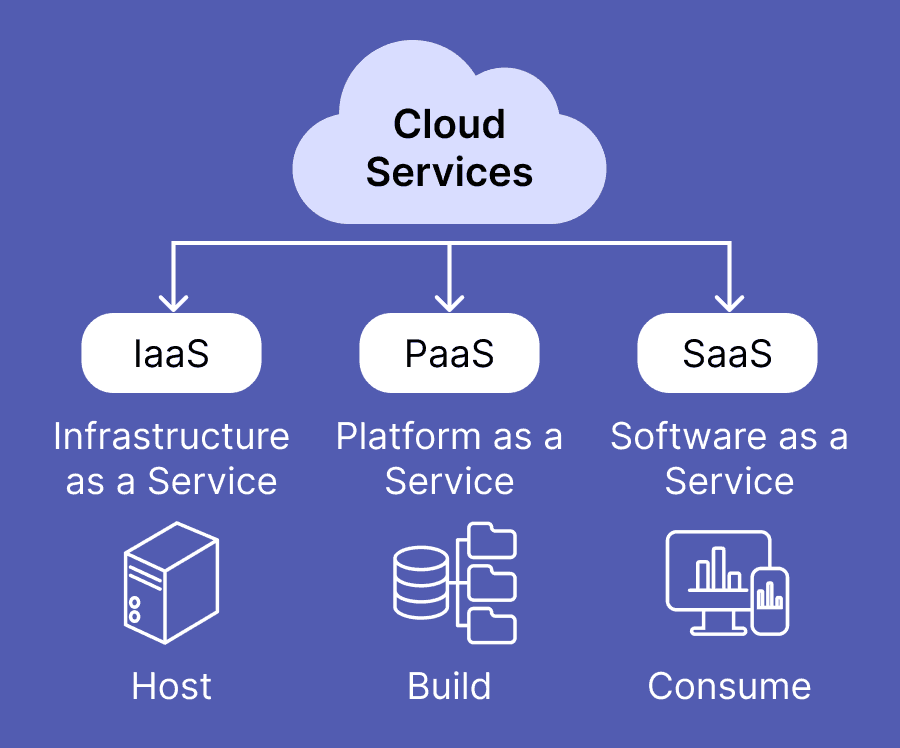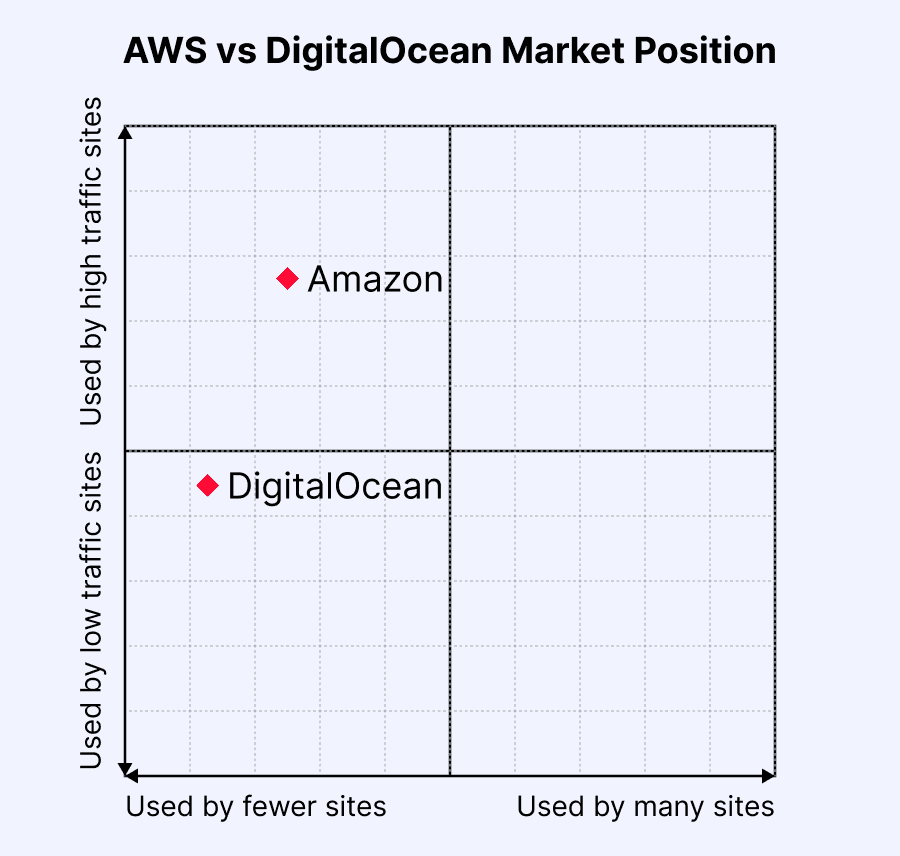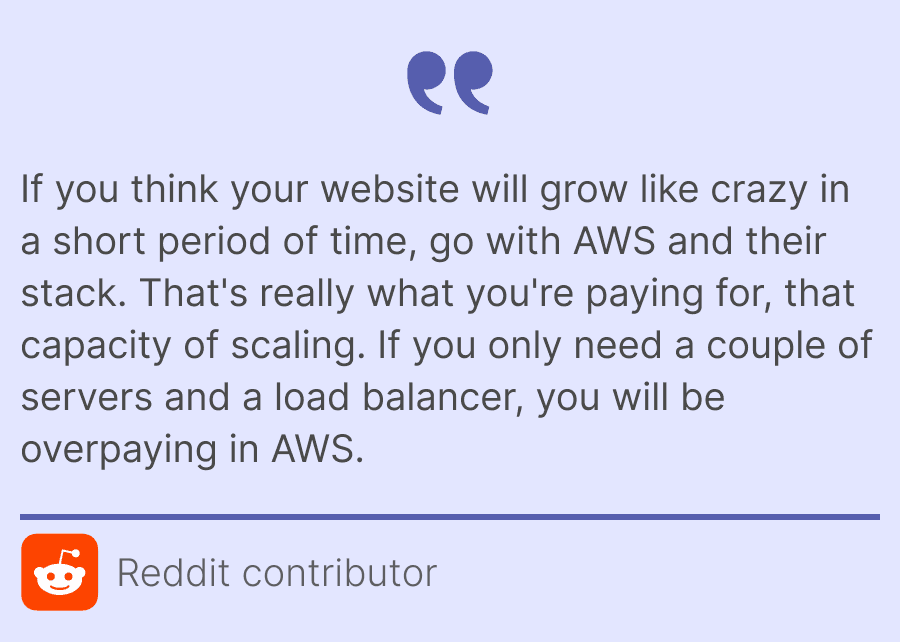DigitalOcean vs AWS for Startups: Side-by-Side Comparison
Topic: Tech

March 12, 2024
I firmly believe that cloud computing has revolutionized the way startups operate, offering scalable, flexible, and cost-effective solutions like never before. In this article, I will dissect two major players in this domain - AWS and DigitalOcean - providing you with the insights needed to make an informed decision for your startup.
Cloud Services Explained
At their core, cloud services are divided into three main categories:
- Infrastructure as a Service (IaaS)
- Platform as a Service (PaaS)
- Software as a Service (SaaS)
Think of it like this: you can lease the backbone of your digital world (IaaS), craft apps on a platform that's all set to go (PaaS), or access software directly in your browser - no installs, no storage headaches (SaaS). These aren't just tech tools; they're your launchpad, letting you grow and adapt at higher speed.

The core offerings of AWS and DigitalOcean lie in IaaS. Still, both also present diverse PaaS and SaaS functionalities, which are less frequently utilized, to the extent that even users with substantial experience may not be aware of these options.
Impact of Cloud Services on Startup Growth
Cloud services are like rocket fuel for startups. They allow you to add more servers easily during a traffic surge, only incur costs for resources actually used, and implement ready-to-go, pre-configured security features, thereby offering significant time savings. This means you can expand your tech as fast as your business grows, without breaking the bank.
Decoding AWS and DigitalOcean
- AWS: Commanding Cloud Presence
Picture Amazon Web Services (AWS) as the towering giant of cloud computing. It started as a solution for Amazon's immense IT demands, but AWS rapidly outgrew its roots. Today, it stands as a colossus, offering over 200 services from data centers spanning the globe.
AWS's true strength lies in its staggering scale and diverse service offerings. Whether you need computing power that expands alongside your startup's growth or an intricate web of networking capabilities, AWS has it covered. It's the go-to choice for startups dreaming of global impact and aiming for the stars.
- DigitalOcean: Simplicity for Developers
On the other hand, DigitalOcean has carved its niche by championing simplicity in cloud computing. It was born from a desire to strip away the complexities often associated with deploying and managing applications in the cloud. DigitalOcean offers a streamlined platform that's easy to understand and use.
With straightforward pricing and a focus on essentials, DigitalOcean is a breath of fresh air. It caters to smaller teams or startups that want to hit the ground running without getting bogged down in technical intricacies. For these agile teams, DigitalOcean is a developer's dream come true.
AWS vs DigitalOcean Market Position and Popularity
Here’s the diagram compiled using data from W3Techs's Web Technology Surveys that illustrates the market position of AWS vs DigitalOcean as web hosting providers in terms of popularity and traffic as of March 2024.

As we can observe here, DigitalOcean is used by a slightly smaller number of websites than AWS, and those websites significantly differ from AWS-hosted sites by having less traffic. This serves as a compelling testament to the targeted niche DigitalOcean effectively occupies.
DigitalOcean vs AWS Services Breakdown
Let's get straight to what AWS and DigitalOcean can do for your startup.
| Service | AWS | DigitalOcean |
|---|---|---|
| Web Hosting | Flexible hosting with auto-scaling. Handles traffic spikes well. | Easy to set up for quick launches. Good for less complex sites. |
| Databases | Wide range of databases for all uses. Automates backups and updates. | Simplified setup for common databases like PostgreSQL. |
| Storage | Secure and vast options for storing anything. Scales with your needs. | User-friendly storage, good for getting started without hassle. |
| Compute Power | Powerful servers that scale for any task, big or small. | More straightforward, cost-effective for small to medium tasks. |
| CI/CD Pipeline Tools | Offers a broad array of advanced tools for automating software release processes, supporting large-scale operations. | Focuses on simplicity and integration, ideal for straightforward and quick deployments. |
| Virtual Private Cloud (VPC) | Provides advanced networking features, suitable for complex applications requiring fine-grained security control. | Offers an easier setup for VPC, ideal for simpler or smaller scale applications. |
| Content Delivery Network (CDN) | Extensive global network, offering advanced configurations for optimizing content delivery. | Provides a more accessible CDN setup, focusing on ease of use and speed improvement. |
| Load Balancers | Offers more detailed control and configurations for handling traffic, supporting a wide range of protocols. | Provides load balancing with an emphasis on ease of setup and automatic scaling. |

AWS vs DigitalOcean: Support for Emerging Technologies
AWS has its own numerous advancements in various cutting-edge technologies. In contrast, DigitalOcean primarily focuses on providing essential cloud infrastructure services. When choosing between the two, consider the specific needs of your project and the level of support required for emerging technologies.
| Service | AWS | DigitalOcean |
|---|---|---|
| Machine Learning | AWS provides comprehensive machine learning services like SageMaker, Rekognition, and Polly. | DigitalOcean offers limited machine learning capabilities, primarily through third-party integrations. |
| Artificial Intelligence | AWS offers AI services like Amazon Lex, Comprehend, and Polly. | DigitalOcean does not have native AI services but may support AI workloads through third-party solutions. |
| Blockchain | AWS provides managed blockchain services like Amazon Managed Blockchain. | DigitalOcean does not offer native blockchain services but may support blockchain deployments through infrastructure provisioning. |
| IoT (Internet of Things) | AWS offers IoT services like AWS IoT Core for connecting and managing IoT devices securely. | DigitalOcean does not provide native IoT services but can support IoT solutions through custom configurations. |
| Edge Computing | AWS offers AWS Wavelength for bringing AWS services to the edge of the 5G network. | DigitalOcean does not have native edge computing services but can support edge computing applications through infrastructure deployment. |
| Serverless Computing | AWS provides AWS Lambda for serverless computing. | DigitalOcean offers limited support for serverless computing through third-party integrations. |
Beyond the Services
With considerable experience on both platforms, I can confidently state that beyond what they offer, various essential differences between AWS and DigitalOcean significantly affect your choice. Let's analyze these extra criteria to determine which service better matches your needs.
| Aspect | AWS | DigitalOcean |
|---|---|---|
| Performance | High computing power and scalability for demanding applications. | Reliable performance for applications with stable demands. |
| Security | Extensive security and compliance features for stringent requirements. | Streamlined, effective security suitable for startups and simple projects. |
| Ease of Use | Comprehensive tools with a steeper learning curve. | Intuitive interface for easy setup and quick project launches. |
| Support | Extensive documentation and expert support for complex needs. | Community-driven support with helpful guides for common issues. |
AWS vs DigitalOcean Pricing Analysis for Startups
Please note, concerning the management of your startup's cloud computing financials, AWS and DigitalOcean adopt various methods for their pricing schemes.
AWS: Operates on a pay-as-you-go model. This means you pay only for the specific resources you use, from computing power to storage. It's flexible, adapting to your startup's usage patterns, but can vary month to month depending on how much you consume.
DigitalOcean: Offers transparent, flat-rate pricing. Every month, you'll know exactly what you're paying because DigitalOcean charges a fixed rate for its services. This model is especially helpful for startups needing to budget carefully and predict monthly expenses without surprises.
Evaluating Cost-Effectiveness for Startups
Let’s evaluate which platform is more cost-effective for emerging businesses, considering your startup's needs:
- For Predictable Workloads: DigitalOcean shines if your startup has consistent and predictable demands. Its flat-rate pricing means you can easily budget for your cloud services without worrying about fluctuating costs.
- For Rapid Growth: AWS might be the better choice for startups poised for rapid expansion. The platform's wide array of services and ability to scale resources up or down means you can adapt quickly to growing demands without overcommitting financially.

Case Study: AWS-based EMS Claims Management Platform
As an example of an AWS-based application, let's discuss the EMS claims management platform created by Cyfrania. It is aimed at addressing common billing challenges encountered by Emergency Medical Services (EMS) organizations. The platform is capable of importing data from electronic patient care reporting (ePCR) software, generating ready-to-bill claims in one click, and automating claim submission.
AWS was selected as the infrastructure backbone for this app based on several compelling reasons:
- Industry Preference: AWS is favored by many hospitals and major insurance providers, facilitating adoption and interoperability within the healthcare ecosystem.
- Security and Compliance: AWS provides security features aligning with stringent healthcare data protection standards such as HIPAA and HITECH.
- Scalability and Performance: For an app that has attracted thousands of private and municipal EMS providers across the US, a platform capable of efficiently serving a rapidly growing number of users is necessary.
- Integration Flexibility: The app needed extensive integrations with popular ePCR systems among EMS providers, a clearinghouse for payment tracking, public databases of patients and payers, and more.
- Cost Efficiency: AWS's pay-as-you-go pricing model was optimal in this case, considering the rapid growth of the user base.
Final Thoughts: Making the Choice
Choosing between AWS and DigitalOcean depends on your startup's specific needs. In summary, both expert opinions and user feedback converge on these key points:
- AWS is suitable for startups requiring a wide range of services and scalability.
- DigitalOcean is ideal for those seeking simplicity and predictable pricing.
Consider your startup's growth trajectory, budget, and technical requirements when making your decision. It's wise to consult development experts who can objectively evaluate the pros and cons of each platform for your specific project requirements.
In particular, Cyfrania is ready to understand your situation, provide neutral guidance, and assess your project for free.
Further Reading
- Cloud computing - an article on Wikipedia
- Cloud Computing Alternatives: AWS or DigitalOcean? - a discussion on Reddit
- How DigitalOcean’s support plans compare to AWS Support for small-to-medium-businesses - a DigitalOcean overview
- DigitalOcean vs Amazon Web Services (AWS) (2024 Comparison) which should you choose? - a user survey on HostAdvice
- Ask HN: DigitalOcean vs. AWS - FAQ on YCombinator
- Amazon EC2 vs DigitalOcean vs Firebase: What are the differences? - an article on StackShare